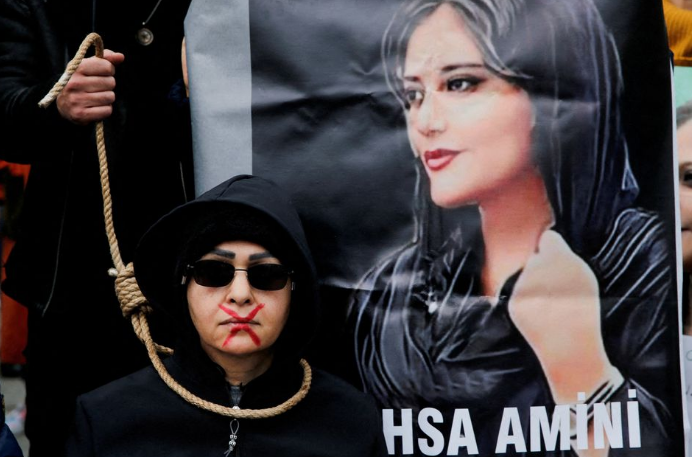Amjad Amini, the father of Mahsa Amini, was temporarily detained on Saturday, as reported by human rights organizations, amid heightened security forces’ presence on the first anniversary of his daughter’s death while in Iranian police custody. Mahsa Amini’s death had sparked months of widespread anti-government protests across the nation.
The Kurdistan Human Rights Network stated that Amjad Amini had been warned against commemorating his daughter’s death anniversary before eventually being released. Iran’s official IRNA news agency denied that Amjad Amini was arrested, though it did not clarify whether he was briefly detained or issued a warning.
Social media reports and statements from rights groups indicated that security forces had deployed around Amini’s residence in Saqez, located in western Iran, in anticipation of the anniversary.
Mahsa Amini, a 22-year-old Kurdish woman, died while in the custody of the morality police last year, allegedly for violating Iran’s mandatory dress code. Her tragic death ignited widespread protests, marking one of the largest displays of opposition to Iranian authorities in recent years. Many protesters called for an end to the more than four-decade-long rule of the Shi’ite clerics.
According to social media posts, Amini’s parents had announced earlier in the week that, despite government warnings, they intended to hold a “traditional and religious anniversary ceremony” at their daughter’s grave in Saqez.
Human rights groups reported a substantial security force presence in Iran’s predominantly Kurdish areas in anticipation of potential unrest. Additionally, widespread strikes were reported in various cities in Iran’s Kurdistan region.
Contrary to these reports, IRNA described Amini’s hometown, Saqez, as “completely quiet” and asserted that calls for strikes in Kurdish areas had failed due to “people’s vigilance and the presence of security and military forces.” The news agency quoted an official in Kurdistan province who stated, “Several agents affiliated with counter-revolutionary groups who had planned to create chaos and prepare media fodder were arrested in the early hours of this morning.”
During the protests following Mahsa Amini’s death, more than 500 people, including 71 minors, were killed, hundreds were injured, and thousands were arrested, according to rights groups. Iran also executed seven individuals linked to the unrest.
In a report issued last month, Amnesty International accused Iranian authorities of subjecting victims’ families to arbitrary arrests and detention, imposing harsh restrictions on peaceful gatherings at grave sites, and vandalizing victims’ gravestones.
Numerous individuals, including journalists, lawyers, activists, students, academics, artists, public figures, and members of ethnic minorities, who were accused of having ties to the protest wave, as well as relatives of protesters killed during the unrest, have faced arrests, summons, threats, or job terminations over the past few weeks. Both Iranian and Western human rights groups have reported on these actions.
Furthermore, Iran’s Etemad daily reported in August that Saleh Nikbakht, the lawyer representing Amini’s family, was facing charges of “propaganda against the system.” If convicted, Nikbakht could face a prison sentence ranging from one to three years.








 India
India











